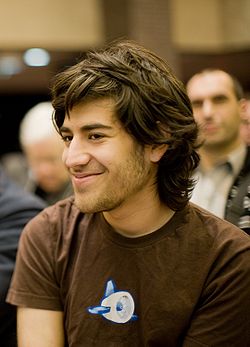Sjokkerende nyheter tikker inn fra over dammen. Tirsdag 19. juli ble tidligere leder av Demand Progress (Forlang Forandring), Aaron Swartz tiltalt av den amerikanske regjeringen. Han er siktet for angivelig å ha lastet ned for mange tidsskriftartikler fra internett. Regjeringen hevder at om du laster ned så mange tidsskriftartikler, utgjør man en hacker-forbrytelse og bør straffes med fengsel. Swartz risikerer 35 års fengsel og $ 1 million i bot om han blir dømt. Demand Progress har hele tiden jobbet for et fritt internett.
Siktelsen er enda mer meningsløs ved at de påståtte offerne Massachusetts Institute of Technology og JSTOR har frafallt ethvert krav mot Aaron Swartz og forklart at de ikke har lidt noe tap eller skade, og også bedt regjeringen om ikke å straffeforfølge ham. Dette selv om serverne til JSTOR ved flere anledninger var nede pga. Aarons nedlastninger, som angivelig var på mer en fire millioner over en periode fra September 2010 til Januar 2011.
James Jacobs, Government Documents Librarian at Stanford University, hvor Aron holdt til, fordømmer arrestasjonen: » Påtalen undergraver faglige spørsmål og demokratiske prinsipper,» sier Jacobs. «Det er utrolig at regjeringen ville forsøke å fengsle noen opp for angivelig å søke opp artikler på et bibliotek.»
 Demand Progress arbeider for å skape progressive politiske endringer for vanlige folk gjennom organisering, lobbyvirksomhet, og valg i USA. I hovedsak har de hatt kampanjer for å holde internett åpent og fritt og kjempet for retten til å slippe å måtte registrere seg for å være på nett, noe som i den senere tid har blitt foreslått en rekke ganger (the internet Kill Switch). De har også kjørt kampanjer til støtte for WikiLeaks og Whistleblowers og kampanjer mot fortsettelsen av Patriotic Act; obligatorisk internett ID; internett svartelisting og naken-scannere.
Demand Progress arbeider for å skape progressive politiske endringer for vanlige folk gjennom organisering, lobbyvirksomhet, og valg i USA. I hovedsak har de hatt kampanjer for å holde internett åpent og fritt og kjempet for retten til å slippe å måtte registrere seg for å være på nett, noe som i den senere tid har blitt foreslått en rekke ganger (the internet Kill Switch). De har også kjørt kampanjer til støtte for WikiLeaks og Whistleblowers og kampanjer mot fortsettelsen av Patriotic Act; obligatorisk internett ID; internett svartelisting og naken-scannere.
De kjører en rekke online-kampanjer for å samle folk til å iverksette tiltak på nyhetene som påvirker dem ved å kontakte kongressen og andre ledere og å finansiere kampanjer og spre ordet i sine lokalsamfunn. På det meste har de samlet sammen 325.000 underskrifter.
Demand Progress har tilhold i Washington og rekrutterer og arbeider med kandidater over hele landet for å hjelpe dem å vinne kampanjer drevet av vanlige mennesker i stedet for av store bedrifter.
Du kan ta en titt på Demand Progress´ kampanjer ved å følge denne linken: http://blog.demandprogress.org/campaigns/
Aaron Swartz er utenom Demand Progress, kjent som medforfatter av RSS 1.0 specification og for sin grundige og kritiske blogg om Wikipedia: Who Writes Wikipedia?
Du kan støtte Demand Progress´ underskriftskampanje til støtte for løslatelse av Aaron Swartz her: http://act.demandprogress.org/sign/support_aaron/?akid=766.424330.yBPquV&rd=1&t=1



Amerikanerne er snart gærnere enn kineserne.
Er ulovlig nedlastning like ille som annet tyveri? Når noen stjeler noe fysisk, blir noe borte, ved nedlastning forblir dokumentene. Utgjør det en viktig forskjell? Akuell kommentar til arrestasjonen av Aaron Swartz http://scholarlykitchen.sspnet.org/2011/10/06/the-aaron-swartz-case-what-does-it-mean-2/
The book Hacking Politics tells the story of how suits, geeks, artists, Occupy, the Tea Party and millions of other Americans came together to save the Internet (for now). We’re honored to get to include contributions from several prominent authors: Cory Doctorow, Lawrence Lessig, Senator Ron Wyden, Congressmembers Ron Paul and Zoe Lofgren, and so many more.
Last fall and winter millions of Americans came together to protest Internet censorship and defeat the Stop Online Piracy Act.
The effort culminated in a week of unprecedented activism, but it took months — even years — to lay the framework that made that possible.
The book Hacking Politics is the story of many of the activists, politicians, academics, artists, and others who helped attune the Internet public to the threat of SOPA — and beat it back.
It will be edited by Demand Progress and Don’t Censor the Net — two of the many groups that helped kill SOPA and save the Internet (for now).
http://www.indiegogo.com/hackingpolitics
Aaron Swartz ble funnet død 8. februar 2013.
Fra HuffPo:
Open democracy advocate and internet pioneer Aaron Swartz was found dead Friday in an apparent suicide, flooding the digital spectrum with an outpouring of grief. He was 26 years old.
Swartz spent the last two years fighting federal hacking charges. In July 2011, prosecutor Scott Garland working under U.S. Attorney Carmen Ortiz, a politician with her eye on the governor’s mansion, charged Swartz with four counts of felony misconduct — charges that were deemed outrageous by internet experts who understood the case, and wholly unnecessary by the parties Swartz was accused of wronging.
Swartz repeatedly sought to reduce the charges to a level below felony status, but prosecutors pressed on, adding additional charges so that by September 2012 Swartz faced 13 felony counts and up to half a century in prison.
Swartz had long lived with depression and a host of physical ailments, which made his accomplishments that much more astonishing. Barely a teenager, he codeveloped the RSS feed, before becoming one of the earliest minds behind Reddit.
Ortiz’s office declined to comment for this article. Late on Saturday, Swartz’s family issued a statement mourning the loss of their loved one’s «curiosity, creativity» and «commitment to social justice.» They also put some of the blame for Swartz’s death on federal prosecutors.
«Aaron’s death is not simply a personal tragedy,» the statement reads. «It is the product of a criminal justice system rife with intimidation and prosecutorial overreach. Decisions made by officials in the Massachusetts U.S. Attorney’s office and at MIT contributed to his death. The US Attorney’s office pursued an exceptionally harsh array of charges, carrying potentially over 30 years in prison, to punish an alleged crime that had no victims.»
«We need a better sense of justice, and shame. For the outrageousness in this story is not just Aaron. It is also the absurdity of the prosecutor’s behavior,» Lessig wrote. «[Aaron] was brilliant, and funny. A kid genius. A soul, a conscience, the source of a question I have asked myself a million times: What would Aaron think? That person is gone today, driven to the edge by what a decent society would only call bullying.»
Swartz’s friend Henry Farrell, a political scientist at George Washington University, also pointed at the DOJ. «His last two years were hard, thanks to the U.S. Department of Justice, which engaged in gross prosecutorial overreach on the basis of stretched interpretations of the law,» he told HuffPost. «They sought felony convictions with decades of prison time for actions which, if they were illegal at all, were at most misdemeanors. Aaron struggled sometimes with depression, but it would have been hard not to be depressed in his circumstances. As Larry Lessig has rightly said, this should be a cause for great shame and anger.»
Les hele artikkelen her: http://www.huffingtonpost.com/2013/01/12/aaron-swartz_n_2463726.html
Han döde 11.januar. En tragedie så fryktelig at jeg finner ikke ord.
3 år etter Aarons død, er flere av hans tekster samlet til en bok, The Boy Who Could Change the World: The Writings of Aaron Swartz.
«Throughout the book—and throughout Aaron’s Life—there’s a strong theme: technology shouldn’t just be for techies. Tech can, and should, benefit everyone. He played key roles in the development of Creative Commons, RSS, and RDF, all technologies that are inherently about making information accessible to more people.
In the book are several blog posts documenting Aaron’s unsuccessful 2006 run for the Wikimedia board of directors. He shares what was a minority opinion among the Wikimedia community at the time: that it’s outsiders, not loyal Wikipedians, that make the most important contributions to the free encyclopedia (Wikipedia co-founder Jimmy Wales had frequently argued the opposite).»
https://www.eff.org/deeplinks/2016/01/boy-who-could-change-world